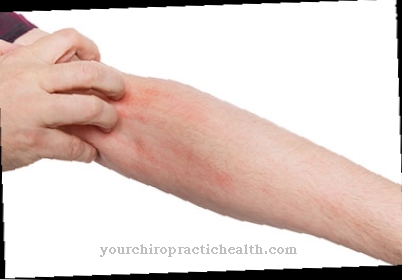scurvy is probably the oldest known disease caused by malnutrition. An undersupply of vitamin C for several months can lead to various symptoms of illness which, if left untreated, can lead to the death of the person concerned. Historically, scurvy was widespread among sailors and soldiers, while today it occurs in regions affected by famine.
What is scurvy?

© bilderzwerg - stock.adobe.com
scurvy occurs as a result of a persistent undersupply of ascorbic acid, commonly known as vitamin C. Since ascorbic acid cannot be produced by the body, the supply must be secured by the consumption of foods that contain a sufficient amount of vitamin C.
This includes fruits and vegetables as well as fruit extracts such as juices. Vitamin C is also found in liver and oysters. If the metabolism lacks vitamin C, it loses the ability to form collagen, which is mainly contained in connective tissue and the skin, and to absorb iron.
Scurvy only occurs after several months as a result of this malnutrition, although vitamin C cannot be stored in the body in advance.
causes
scurvy is a typical deficiency symptom caused by insufficient nutrition. Usually, to avoid scurvy, a person needs a balanced diet to maintain a healthy metabolism and adequate supply of cells.
Vitamin C is a necessary component and is part of the daily diet mainly in the form of fruits and vegetables. If these foods are not consumed voluntarily or as a result of a lack of vitamin C in the daily diet, scurvy develops.
Scurvy usually only occurs sporadically in industrialized countries and then mainly affects people who adhere to a one-sided diet or who are no longer able to put together a proper diet due to age. Alcoholics who neglect healthy meals can also experience scurvy.
Symptoms, ailments & signs
Scurvy manifests itself mainly in the form of general exhaustion and tiredness. Furthermore, wounds heal poorly or not at all. If the supply of vitamin C is not available for a longer period of time, it can also lead to bleeding gums and gum overgrowth as well as tooth loss and bleeding in the tongue.
As the disease progresses, muscle wasting, bone pain, high fever, and severe diarrhea occur. Skin problems in the form of inflammation or bleeding are also not uncommon.Due to the weakened immune system, the body is also prone to infections of all kinds.
Scurvy is therefore not infrequently a breeding ground for other diseases. The disease can also be fatal in some cases. Such cases are particularly common because of heart failure. In severe scurvy, depression can also be observed in some cases, the cause of which is not yet fully understood.
Symptoms on the patient's bones are not obvious. Scurvy leads to significant lift-offs there, which can restrict movement and lead to limping. Growth is also restricted in children and adolescents. Depending on the duration and course of the disease, the bone age is about one or two years behind the biological age.
Diagnosis & course
The attending physician diagnoses scurvy based on the external symptoms and an extensive questioning of the patient about his eating habits. To confirm the diagnosis, a blood test is carried out to determine the level of ascorbic acid in the blood.
Scurvy initially begins with inexplicable fatigue and weight loss in the patient. Loss of appetite, which aggravates the scurvy, and diarrhea are also some of the initial symptoms. In the further course pain especially in the area of the longer skeletal bones, fever, accelerated breathing and feelings of numbness occur.
Scurvy is advanced when there is bleeding from the gums and loosening of the teeth. Symptoms of advanced scurvy include protruding eyeballs, bleeding from the skin, and severe joint pain. If left untreated, heart failure as a result of scurvy can lead to death.
Complications
If left untreated, scurvy can cause serious complications such as tooth loss and poor wound healing. In connection with the increased susceptibility to infections, tooth loss is particularly problematic - dangerous inflammations in the oral cavity can occur. As a result of muscle wasting, extreme tiredness occurs, which increases the risk of falls and accidents in everyday life. The loss of appetite favors the typical deficiency symptoms and can lead to chronic eating disorders.
Finally, there can be dangerous bleeding into the skin and severe joint pain. As a result, scurvy leads to pronounced cardiac insufficiency and, as a result, to a heart attack and ultimately to the death of the sick person. When treating scurvy, the risks emanate from the drugs and preparations prescribed.
In the event of an overdose, ascorbic acid can cause gastrointestinal complaints such as diarrhea and gastric pressure. In addition, vitamin C increases the absorption of iron from food, which can lead to symptoms with some previous illnesses. Painkillers and fever medication can cause various side effects and interactions.
Often there are headaches, skin irritations, problems of the gastrointestinal tract, for example. Allergic reactions and intolerance to the prescribed drugs and food supplements cannot be ruled out.
When should you go to the doctor?
Scurvy is one of those diseases that has many signs. If there is increased bleeding from the gums and fatigue, a doctor can be consulted. However, there is no reason to go to an emergency room straight away. Only a progressive scurvy disease, which is already noticeable with a weak heart and similarly serious symptoms, is a medical emergency.
Overall, the symptoms of scurvy are so varied that they can justify a visit to the doctor on their own. A dermatologist should be consulted for the skin problems, the gum problems can be assessed by a dentist. A general practitioner will be helpful for general symptoms. The diagnosis of scurvy is quite clear and can be made by any doctor. Therefore, the doctor can also be consulted if a vitamin C deficiency is suspected. Affected people would do well, however, to take immediate action if they suspect this nutritional deficiency and to compensate for it.
In case of doubt, the family doctor should always be consulted. The suspicion of scurvy is closer to certain risk groups. These are the elderly, people with a very biased diet and smokers. All of these groups of people occasionally consume too little vitamin C.
Treatment & Therapy
Is healed scurvy by the administration of ascorbic acid. At the onset of the symptoms of deficiency, the intake of foods that have a high percentage of vitamin C is sufficient to quickly resolve the symptoms and cure scurvy.
Historically, this was recognized as early as the 18th century by the English doctor James Lind, through whose prescription of lime juice scurvy was successfully contained in the seamen of the English Navy.
The modern treatment of advanced symptoms of scurvy consists of oral administration of high doses of ascorbic acid or injections, which have a quick effect. Slight deficiency symptoms of scurvy, which can occur as a result of a bad diet, can also be compensated for with orange juice.
In addition, painkillers and medication for diarrhea and fever are given in scurvy in order to alleviate the accompanying symptoms.
prevention
scurvy is usually easy to avoid if the correct composition of the foods is observed in the daily diet. Fruits and vegetables as well as fruit juices contain enough vitamin C to rule out scurvy. In the case of a one-sided diet, which is always inadvisable, you should at least make sure that enough vitamin C is supplied in the form of food supplements. Travelers to regions with insufficient supply can prevent scurvy by having enough vitamin C tablets.
Aftercare
After successfully treating scurvy, the goal of follow-up care is to maintain healthy vitamin C levels. Only a sufficient supply of vitamin C prevents the disease from recurring. The best way to get vitamin C is through food. A balanced diet is the most important thing you should do after completing treatment.
Healthy, fresh foods provide the body with sufficient vitamin C. Fruits and vegetables in particular should be on the menu in sufficient quantities. If not enough vitamin C is absorbed through food, vitamin C preparations and food supplements are essential. It should be noted that too much vitamin C can also have negative consequences for the body. The body excretes too much vitamin C through the kidneys.
Diarrhea or flatulence can be the first warning signs of oversupply. In the worst case, the body can form kidney stones, which can lead to colic and severe pain. Those affected should pay close attention to their body in order to feel the first warning signals. If symptoms of a renewed vitamin deficiency occur, a doctor must be consulted immediately. Once the cause of the disease has been identified, the trigger should be avoided in the future. This is the only way to rule out another illness.
You can do that yourself
To counteract scurvy, the consumption of fresh fruits and vegetables is advisable. According to the recommendation of scientists, people should eat five servings a day anyway. This is the best prevention against scurvy and a number of other diseases. Those affected should therefore fundamentally change their diet.
At the same time, it is advisable to avoid nicotine and alcohol. Certain vitamin tablets from the drugstore are also enriched with vitamin C and promise a contribution to healing. An unbalanced diet should be avoided. From Asian countries we know that the exclusive consumption of rice can cause the typical symptoms.
Whether self-treatment is successful depends on the extent of the symptoms. A serious course is present today only in regions where there is famine. Self-treatment in the industrialized nations regularly leads to healing due to the abundance of vitamin-containing products. In the case of an unfavorable course, on the other hand, only intravenous administration of vitamin C helps. This is especially true if there has already been a strong decline in strength. In this case you should contact a doctor as soon as possible. There is danger to life.


.jpg)









.jpg)



.jpg)










.jpg)
